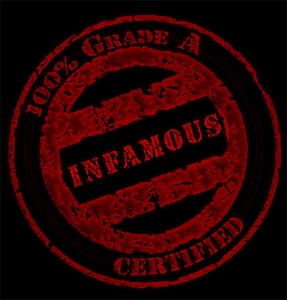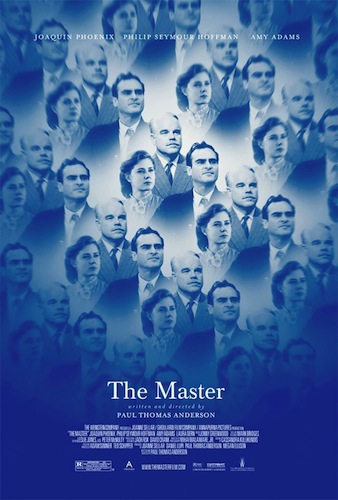
There's a reason Paul Thomas Anderson would register as a top candidate if you were having a debate with your fellow film geeks about the best working director today. Heading into his latest effort, it's been nothing but undeniable success for him. Six films have been written and directed by his hand, and all six have amounted to tremendous stories that you want to show others immediately when they ask if you've seen anything good lately. BOOGIE NIGHTS still ranks as my favorite of the bunch, but I'm not sure many films in general get much better than THERE WILL BE BLOOD, which really looks like it was robbed of the Best Picture Oscar that year when NO COUNTRY FOR OLD MEN took home the top prize.
All too familiar with Anderson's track record of excellence, I was looking forward to see what he had in store for me with THE MASTER. As usual, I always go in just hoping for a good movie. I try my damndest not to let my expectations get the best of me, because that's where you wind up setting yourself up for disappointment when they're not met to your liking. If Anderson had another superb piece of filmmaking up his sleeve, it'd be an extra bonus for me.
So how is THE MASTER? It's pretty good. It's not great, but, as usual, it's still an excellent film, from its complex characters to its visual flair. However, for me, it'd probably fall on the level as his PUNCHDRUNK LOVE - very solid films that just lack some type of connection with the viewer... the lesser of his repertoire. Most directors would kill to have something like THE MASTER be one of their... I don't want to say "worse," because this isn't a bad film by any means... but let's just say it's a bit colder than some of his previous pictures and doesn't have the same biting story and clear vision as the rest of his catalog.
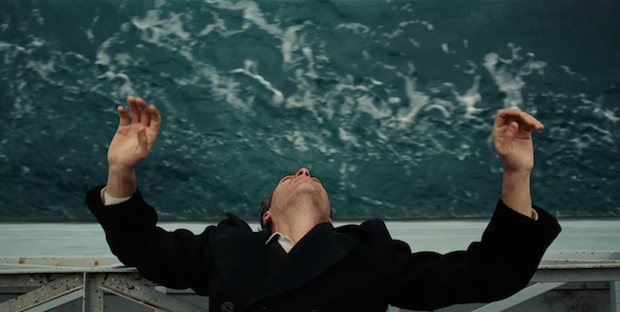
I was very curious to see what Anderson had lined up, having heard that he was tackling Scientology on some level with THE MASTER, and indeed he does, although you'll never hear the cult-like religion mentioned by name in the film. Instead it's simply The Cause, and it's fronted by the charismatic Lancaster Dodd, known simply to his followers as the Master. The core of his beliefs is that the spirit of one's being exists through time, as in it time travels from period to period and body to body, inhabiting a number of personalities from the time of its conception until the moment it no longer ceases to exist. Those spirits don't die as their human hosts do; they just travel between different vessels, carrying with them the experiences and memories and troubles of their previous homes. As a result of this long timeline, the body's present troubles can be examined by looking at events past and, according to the Master, illnesses can be treated before returning to a past life before the ailment ever occurred. It absolutely sounds crazy, but with weak-willed people looking for some type of answers to life's big questions receiving some type of explanation they can rationalize, that's how these fringe religious groups continue to amass followers. And why shouldn't they believe the Master? Philip Seymour Hoffman's portrayal as Dodd - someone who describes himself as "a writer, a doctor, a nuclear physicist, a theoretical philosopher..." and a hopelessly inquisitive man - is filled with such fervor and conviction that for someone to believe something as far-fetched so ardently, they must know it's true... they must have some knowledge that you don't, which you now must seek to acquire.
One such sheep that gets caught up in this system of beliefs is Freddie Quell (Joaquin Phoenix), an ex-Navy seaman looking to find his place in the world after World War II. He has a nervous condition resulting from his military experience. He’s also both sexually obsessed and frustrated at the same time, and he has a penchant for violence with a short temper that is often provoked by the most harmless of actions – like you just standing there looking the way you look. He’s drifted from job to job once his service ended, but with only a past filled with troubles to leave behind, Quell is searching for an identity for himself now – a prime candidate to be drawn into the persuasive ideas of the Cause, which promise a sense of belonging, a sense of community, even if it means being broken down and rebuilt with a mindset susceptible to control.
When their paths cross, THE MASTER explodes into some intensely spellbinding confrontations between them. From the moment they engage in Freddie’s first informal processing for the Cause, which is a series of questions, some seemingly random, which subtlely and matter-of-factly delve into some of the more personal and darker aspects of one’s personality and past, you can see both of these fine actors are bringing their best to bounce off the other’s performance.
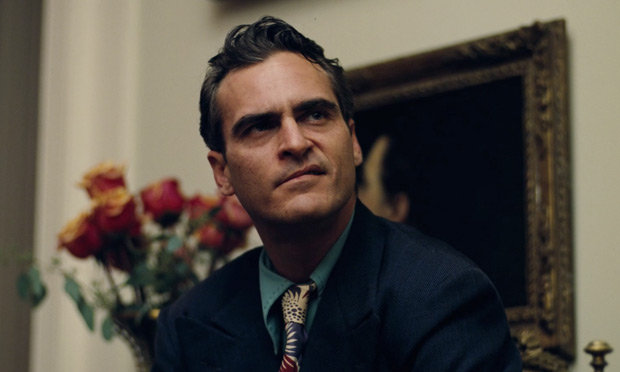
Phoenix is strong in the role, but Freddie isn’t nearly as complex as his Master… the Master. There’s much less of an arc to a man whose first reaction to anything against him is to bring violence. Even as he’s deemed beyond help by the Master’s wife (Amy Adams) and son-in-law (Rami Malek), both of whom are unwaveringly devoted to the Cause, there’s a sense that he’ll never let go of control as he goes through a regular routine of exercises that are designed to strip his self of individuality away from him, pushing him more towards a group think. Freddie’s lack of focus and concentration and probably intelligence keep the drifter from ever finding a home, even if that home is formed based on the ideas of a man telling tales of science fiction and supernatural events.
But Hoffman is really the fire of the film. You can’t stop him; you can only hope to contain him, and much of that containment comes from shared screen time with Phoenix, as the Master must relegate himself to a secondary role as we follow Freddie’s continued path of aimlessly wandering through life. However, when Hoffman has all focus on him, sans Phoenix, you’re witnessing something incredible, with Hoffman serving as no different than a charismatic reverend that’s able to lift his congregation up merely by using his words, and then is able to command their specific actions, because they’ll easily given themselves up to him. His words do nothing more than fill a void for people who need some void repair done. He’s like a walking horoscope, telling you things that you can look for some truth in and, as a byproduct of that, support.
There’s a fiery exchange between the Master and a non-believer during a gathering early in the film, which leads to Hoffman going on the offensive in order to play defense from the skepticism and questions that surround his teachings, but all it does it leads to some bigger questions about the motivations for the Cause, which I think weaken THE MASTER. From this grilling, Hoffman is able to rattle off the basics of his beliefs quickly and firmly, as if he does believe everything he passes along wholeheartedly. However, there’s a moment later in the film where his son unequivocally states to Freddie that the Master is just making it up as he goes along, a claim that seems to gain some credence a bit later when it comes time for the presentation of Book 2 of the Cause and any changes that may come with it. Does the Master believe what he preaches? Is it all bullshit that he’s making up as he goes? If so, why does he do it, as it doesn’t appear he’s gaining anything financial from his movement? Is it acceptance from others he himself desires? By THE MASTER choosing to tell the story of Freddie, we’re left with a far more fascinating examination of the Master unresolved, as the questions of how and why surrounding him remain as fresh as they were upon our introduction to him. An entirely different film could be made just taking a look at his process, one that I’d welcome as I’d like to see Hoffman really into the headspace of what makes a complex character like that tick, but, because Anderson never really digs any deeper than the service to come up with answers for the Master, the film feels a bit incomplete.
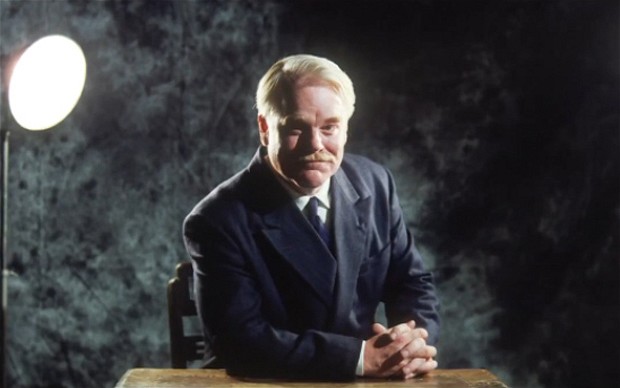
There are stretches when THE MASTER is brilliant and mysterious and gorgeous to watch. Other times, it can be maddening and frustrating and boring, with sequences that seem to take quite some time to develop for little payoff. There are a vast array of interesting ideas dealing with Scientology and religion and identity and control that Anderson does tackle, but there’s only so much intelligence that can be hoisted upon one film. That doesn’t mean THE MASTER ever dumbs itself down. In fact, it’s quite the opposite… THE MASTER never lets up on forcing you to think about and consider the topics it chooses to bring to the forefront. The problem with that though is that THE MASTER tries to do too much at one time, and it can overwhelm the film in bouts.
The two lead performances here make THE MASTER as good as it is, and this still is a very quality picture from Paul Thomas Anderson. However, it can be bloated in parts, and the skittishness to really dive into what makes the Master by focusing on the unwavering arc of Freddie for far too long prevent it from being another classic notch in the director’s belt.
-Billy Donnelly
"The Infamous Billy The Kidd"
Follow me on Twitter.
